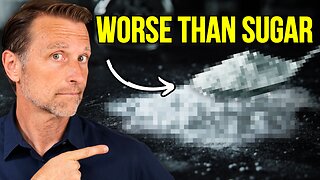Premium Only Content

Getting Arrhythmias After You Break a Fast?
NEW KETO RECIPES CHANNEL: https://www.youtube.com/channel/UCnAGH-jp4YXl30rir1BPrxA/
Do you experience arrhythmias after fasting? Here’s what you need to know.
Timestamps:
0:00 Arrhythmia after breaking a fast
0:22 Why arrhythmias can occur after a fast
0:40 Insulin and electrolytes
1:08 How electrolytes are stored
2:03 How to help prevent arrhythmias after fasting
In this video, I want to talk to you about what you can do if you experience arrhythmia after breaking a fast. Arrhythmia is an abnormal heartbeat—this could be a palpitation or a skipped beat. Keep in mind that these are only my opinions. Check with your doctor before taking any of my advice.
Arrhythmias can often occur when you are not doing keto, but you’re doing fasting. If you do a long fast—say, over 48 hours—and then you consume a big high-carb meal. You may notice some problems in your body simply because you’re going to spike your insulin levels.
Insulin moves electrolytes from the blood to inside the cell. This causes a sudden shift in potassium, magnesium, sodium, chloride, and phosphorous. When this shift happens, you have significantly fewer electrolytes in the blood.
On top of this issue, you may already be deficient in electrolytes from fasting—particularly if you aren’t taking electrolytes regularly while on a fast.
This is a more common problem you may see if you are fasting for prolonged periods of time.
Here’s what you should do:
1. Stay on keto
2. Take electrolytes during your fast
3. Break long fasts with a smaller meal
Talk to a Product Advisor to find the best product for you!
Call 1-540-299-1556 with your questions about Dr. Berg's products. Product Advisors are available Monday through Friday 8am-6pm and Saturday 9am-5pm EST.
* At this time, we no longer offer Keto Consulting and our Product Advisors will only be advising on which product is best for you and advise on how to take them.
Dr. Eric Berg DC Bio:
Dr. Berg, age 56, is a chiropractor who specializes in Healthy Ketosis & Intermittent Fasting. He is the author of the best-selling book The Healthy Keto Plan, and is the Director of Dr. Berg’s Nutritionals. He no longer practices, but focuses on health education through social media.
Follow us on FACEBOOK: fb.me/DrEricBerg
Send a Message to his team: m.me/DrEricBerg
ABOUT DR. BERG: https://bit.ly/2VjAVDR
Disclaimer:
Dr. Eric Berg received his Doctor of Chiropractic degree from Palmer College of Chiropractic in 1988. His use of “doctor” or “Dr.” in relation to himself solely refers to that degree. Dr. Berg is a licensed chiropractor in Virginia, California, and Louisiana, but he no longer practices chiropractic in any state and does not see patients so he can focus on educating people as a full time activity, yet he maintains an active license. This video is for general informational purposes only. It should not be used to self-diagnose and it is not a substitute for a medical exam, cure, treatment, diagnosis, and prescription or recommendation. It does not create a doctor-patient relationship between Dr. Berg and you. You should not make any change in your health regimen or diet before first consulting a physician and obtaining a medical exam, diagnosis, and recommendation. Always seek the advice of a physician or other qualified health provider with any questions you may have regarding a medical condition.
Thanks for watching. I hope this quick video helped clear up why you might have arrhythmias after a fast, and what you can do to prevent them from happening.
-
 7:29
7:29
Dr. Eric Berg
10 days agoThe #1 Vitamin Depleting Food in the World
9.59K9 -
 LIVE
LIVE
Dr Disrespect
4 hours ago🔴LIVE - DR DISRESPECT - KINGDOM COME: DELIVERANCE 2 - FIRST IMPRESSION
3,826 watching -
 9:06
9:06
CryptoWrld
10 hours ago $0.82 earnedHow Nonprofits Use Blockchain Tech
8.87K2 -
 16:38
16:38
SLS - Street League Skateboarding
14 days agoRayssa Leal's Most Clutch SLS Wins Ever! 🥶🏆
73.8K3 -
 1:06:29
1:06:29
Russell Brand
4 hours agoGaza Takeover? Trump’s Bold Plan Sparks Global Outrage – SF532
113K237 -
 1:57:32
1:57:32
The Charlie Kirk Show
3 hours agoGaza Thoughts + DOGE The Destroyer | Sen. Schmitt, Benz | 2.5.2025
124K25 -
 1:21:08
1:21:08
Simply Bitcoin
4 hours ago $1.30 earnedNEW REPORT: Bitcoin ETF Insider Doubles Down on UNTHINKABLE 2030 prediction! | EP 1176
33.5K1 -
 2:50:42
2:50:42
The Dana Show with Dana Loesch
3 hours agoTRUMP PLANS TO TAKE OVER GAZA | The Dana Show LIVE On Rumble!
33.2K6 -
 59:36
59:36
The Dan Bongino Show
6 hours agoTrump Shocks The World With Major Announcement (Ep. 2416) - 02/05/2025
804K1.63K -
 1:19:04
1:19:04
The Rubin Report
5 hours agoTrump & Netanyahu Shock with Truly Unexpected Plan for Gaza
94.9K119